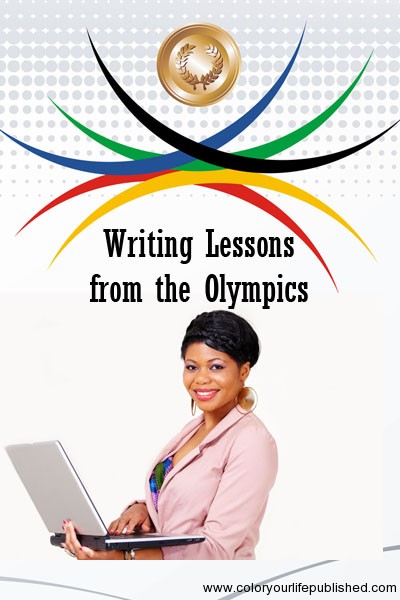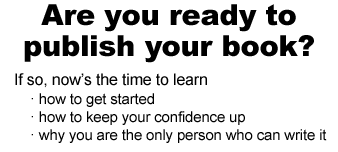 Watching the Olympic athletes perform on the world stage is awe-inspiring. While your success in writing doesn’t usually rest on a single, laser-focused performance, you do face many challenges.
Watching the Olympic athletes perform on the world stage is awe-inspiring. While your success in writing doesn’t usually rest on a single, laser-focused performance, you do face many challenges.
Here are seven lessons you can learn from the Olympics.
1. Surround yourself with great support
When you see a gymnast, swimmer or other athlete accomplish gold medal performances, they may appear to be alone, but we know they are not. We see their coaches, trainers,families and friends on the sidelines who have been with them through many years of training, expense and travel.
Likewise, when you set out to write your book, it begins as a lonely endeavor. Getting your research and rough draft completed is usually done alone.
But behind the scenes, successful writers enjoy the support of a family that gives them space to work, an editor, graphics, a publisher and an agent or coach.
To neglect gathering your success team around you makes your writing harder and publishing your finished book near impossible.
2. Visualize yourself achieving your goal
In Golf My Way, Jack Nicklaus wrote: “I never hit a shot, not even in practice, without
having a very sharp, in focus picture of it in my head. It’s like a color movie.”
Research has proven that being able to visualize what you want to achieve increases
the likelihood that you will reach your goal.
Practice visualizing yourself holding your finished book in your hands,
autographing your book at a signing or receiving applause from a satisfied audience.
3. Be willing to sacrifice for your goals.
Gabby Douglas, one of the women’s gymnastics Olympic team members, left her home
in Virginia home when she was fourteen to train in Iowa. It was a major sacrifice for her and her family.
Some families of Olympians have gone into debt, and many athletes suffer injuries
brought on by extreme training. For sure, their normal lives are put on hold.
Some writers give up watching television, forego family events and even pay for office
or hotel space where they can work undisturbed everyday. You will benefit from
cutting out non-writing activities that don’t advance your goals.
4. Take care of your body.
Winning athletes are vigilant about what they put in their bodies because
they know it’s the fuel that ensures peak performances.
As writers what we eat is also critical since it determines our alertness, creativity
and stamina. Because writing is such a sedentary experience we must pay close
attention to what we put in our mouths to avoid sabotaging our success.
One way to ensure that we work in cooperation with our bodies is to
- only eat when we’re hungry
- keep healthy snacks nearby
- drink plenty water
- get adequate sleep
5. Face your fear
Athletes and writers alike will face fear, uncertainty and bouts with self-doubt.
When both have practiced their skill, the fear is reduced.
Slumps in performance and writer’s block can bring on negative thinking that can diminish and ruin success.
Help yourself by recognizing that fear is normal. Preparing for the inevitable moments of fear is essential.
Preparing well before you begin your work helps reduce fear, as does building your skills.
Like athletes you can use techniques such as meditation, prayer, yoga, affirmations and afformations. Most important is to surround yourself with people, reading and groups who encourage and uplift you.
Actively practicing positive thinking doesn’t make fear completely disappear, but it holds it at bay and brings it under control.
6. When you fall down, get back up
Perhaps one of the most important lessons we can learn from the Olympics is the importance of rebounding when you miss the mark.
Every successful athlete has fallen down, started late, missed the net or otherwise flubbed a performance.
It’s unlikely to find a writer who has not been rejected too. A few of the celebrated ones
- Jack Canfield and Mark Victor Hansen, authors of Chicken Soup for the Soul, reportedly were rejected 140 times with the comments that “anthologies don’t sell” and “too positive”
- J.K. Rowling was rejected 12 times before a small British publisher accepted her on the insistence of his daughter
- Stephen King’s Carrie was rejected 30 times before it was finally accepted by a publisher.
The Japanese proverb says it best: “Fall down seven times, get up eight.”
7. Celebrate when you reach your goal.
When a medalist accepts the gold, silver or bronze, it’s an important time. Acknowledging your accomplishments as a writer is important too. Celebrating is part of the achievement. How you celebrate is up to you.
Going for the gold in writing your book does not require crushing the competition, but reaching your goal is helped by following these seven lessons.
Writing a book is key to establishing credibility and increasing visibility for entrepreneurs today. While entrepreneurs typically have ample material for creating a book, they don’t always have adequate knowledge and skills to navigate through publishing and thus often seek the help of a book coach.
[audio:https://coloryourlifepublished.com/wp-content/uploads/2012/07/What-Entrepreneurs-Need-to-Know-Before-Hiring-a-Book-Coach-Deborah-A.-Bailey.mp3|titles=What Entrepreneurs Need to Know Before Hiring a Book Coach with Deborah A Bailey]
Join me and my guest, Deborah Bailey, author, book coach and radio host, when she discusses what you should know before hiring a book coach, how entrepreneurs can use books to promote their businesses and how to decide whether you should self publish or have your book published by a traditional publisher.











Hello Flora,
Excellent post! I can identify with #5 and #7 is absolutely necessary. Your site is beautiful, cheerful and helpful.
Thank you for sharing your wisdom and uplifting spirit.
Namaste.
Linda
Hi Linda,
I’m delighted that you identified with lessons #5 and #7 and that you like my site.
Thanks for stopping by to join in the conversation.
Flora,
These are helpful reminders! In terms of a support system, I find my writing group to be very essential even at the stage of writing a first draft. I’m not too keen on #3, sacrificing for my goals though! I would like to find a magical way to accomplish my writing goals and have balance in my life. Maybe that’s an impoosible dream!?!
Sandra,
You’re fortunate to have a writing group to give you feedback at that first draft stage.
As for sacrificing for our goals? All of us would like to find our way around this.
Great lessons! We were discussing #3 on my blog today. I have to say, I miss watching the Olympics!
Charlotte,
I’m glad you enjoyed these lessons. Now that the Olympics are over you can get your lessons (and entertainment) from the American presidential election.
Excellent post! Website is beautiful, cheerful and helpful.
Thank you for sharing your wisdom and uplifting spirit.
You’re welcome.